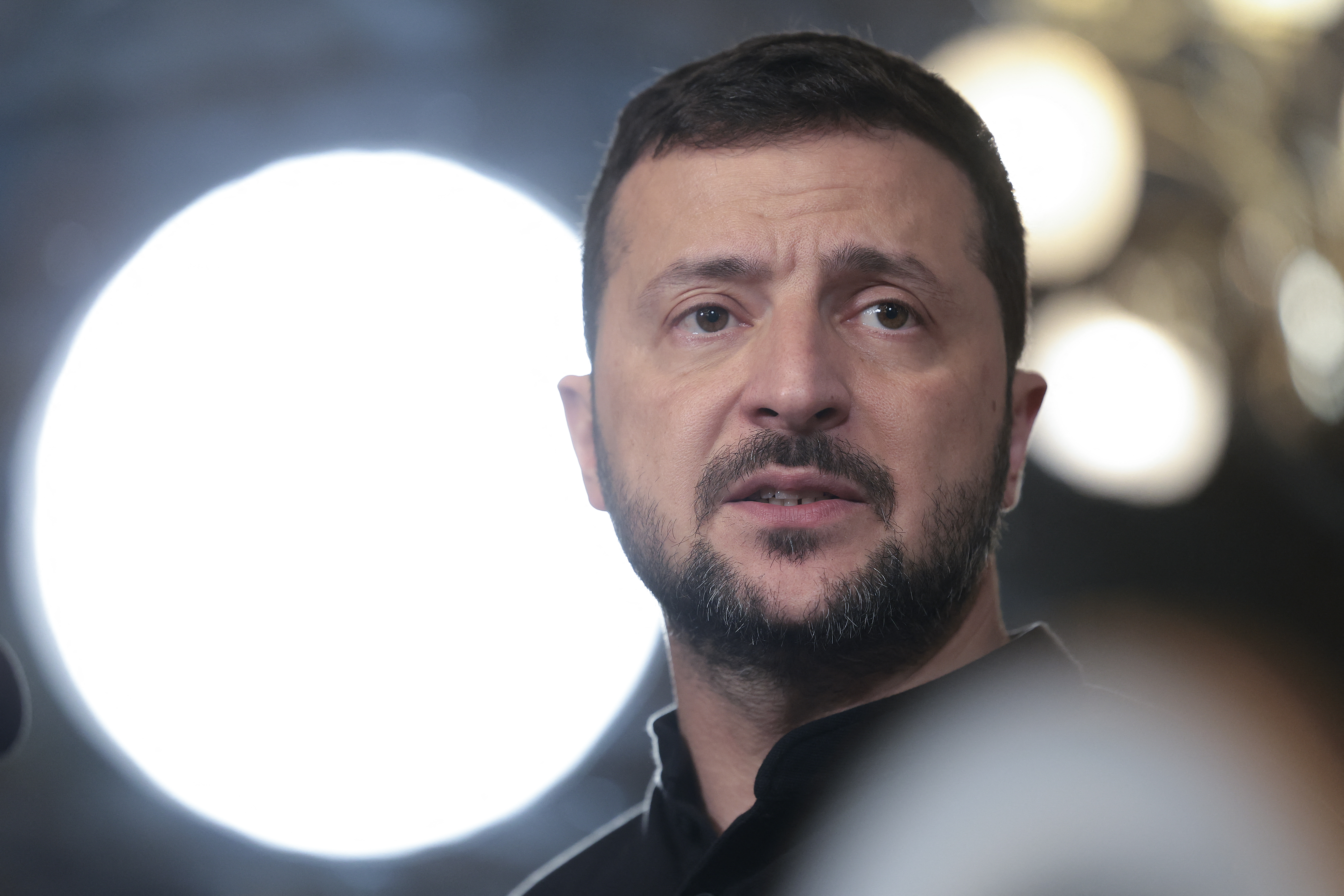With U.S. President Donald Trump’s seemingly changed heart and consequent decision to arm his Ukrainian counterpart, Volodymyr Zelensky, for continuing the fight against Russia may be a great help, but what about the other battle that the latter is facing within the country?
After all, Zelensky’s government in Kyiv is rocked by corruption scandals and purges. Instead of rectifying the situation, Zelensky is increasingly viewed by the Ukrainians as an authoritarian who suppresses dissent, fosters corruption, and prioritizes retaining power at any cost.
Predictably, many Ukrainians have now decided to come out openly in the streets to express their anguish and anger.
Incidentally, in what was Ukraine’s first major anti-government demonstration in three and a half years of war, on Tuesday night (July 22), thousands of people gathered in the streets of Kyiv to protest moves by the Zelensky government to weaken anti-corruption institutions.
On Monday (July 21), Ukraine’s Parliament, controlled by Zelensky’s party, passed a measure stripping away the independence of two agencies responsible for investigating and prosecuting corruption.
It grants Ukraine’s Prosecutor General, appointed by the President, new powers over two anti-corruption agencies: the National Anti-Corruption Bureau and the Special Anti-Corruption Prosecutor. The rationale that was given for this was that Russian Intelligence had infiltrated these organizations.
The demonstrators against this law, who had gathered in Kyiv’s streets, were largely young and peaceful. There were also reportedly similar protests in other cities, such as Lviv.
These demonstrations were apparently promoted widely on social media hours after the new law was legislated. Critics say the new law is part of a broader crackdown on independent news media, government oversight agencies, and other voices critical of Zelensky’s administration.
Reportedly, Semen Kryvonos, Director of the Anti-Corruption Bureau, is upset. He has said that “the imperative to fight high-level corruption was destroyed by the representatives in Parliament”.
Incidentally, this bureau has been investigating people close to Zelensky, including two Deputy Prime Ministers – Minister for National Unity Oleksiy Chernyshov and Oleksandr Kubrakov (in charge of the ministry of “reconstruction”) for embezzlement and treason.
Similarly, the recent arrest of Vitaliy Shabunin, one of Ukraine’s most prominent anti-corruption activists, on the dubious charges of evading military service and fraud, has been the most unpopular development in Ukraine.
Incidentally, Shabunin, founder of the NGO Anti-Corruption Action Centre, had exposed many military-related scandals, including the latest one on the government paying highly inflated prices for food for troops. He also happens to be a strong opponent of the proposed law on defense procurement that would allow the Defense Ministry to exempt chosen companies implementing government contracts from criminal liability.
There are also reports that Zelensky is attempting to sack Major General Kyrylo Budanov, the head of Ukraine’s military intelligence, allegedly due to his discomfort with the military’s current direction and his growing popularity as an alternative leader.
Incidentally, the same thing had happened, and the EurAsian Times had dealt with this at greater length with General Valeriy Zaluzhny, Ukraine’s Commander-in-Chief of the Armed Forces from 2021 to 2024. Zelensky, however, succeeded in persuading the latter to give up his political ambitions and sent him to Ukraine’s ambassador to the United Kingdom.
It is worth noting that when Zelensky assumed office in 2019, fighting domestic corruption was his primary electoral pledge. And corruption-fighting at that time meant identifying economic and administrative lapses and punishing those who benefited from them.
However, the invasion of Russia has made the Ukrainian economy principally oriented towards the war efforts. So, any corruption here means that it is interlinked to the war efforts and weakening them, thus raising the anger and intolerance of the Ukrainian people to a higher level.

Last year, Ukraine’s Security Service (SBU) discovered a mass corruption scheme in the purchase of weapons by the country’s military, amounting to nearly $40 million (1.5 billion Ukrainian hryvnia).
The SBU said the embezzlement involved the purchase of 100,000 mortar rounds for Ukraine’s Armed Forces in August 2022. Five senior officials in the defense ministry and Lviv Arsenal, an arms supplier, came under investigation. According to the SBU, payment was made in advance, with some funds transferred abroad, but no arms were ever provided. “Not a single artillery shell” was ever sent, it said.
Of course, as EurAsian Times has already pointed out, corruption has been a long-standing problem with Ukraine, for which its membership in the European Union (EU) has been facing a major hurdle.
Apparently, Ukraine scored 35 out of 100 points on the 2024 Corruption Perceptions Index (CPI). In a recent study by Transparency International, Ukraine ranks 105th out of 180 countries.
The fact remains that apart from Russia (154), Belarus (114), and Bosnia and Herzegovina (114), no other European country is perceived as more corrupt than Ukraine, according to this Index.
It may be noted that a senior adviser to Zelensky has been under allegations that he was involved in corruption schemes involving Ukrbud Development LLC, one of the largest construction firms in the country. He is Oleh Tatarov Zelensky’s Deputy Chief of Staff at the President’s Office.
In fact, Zelensky’s own integrity has also been called into question lately. There are allegations that he had used offshore companies to manage his wealth and that shortly before his election in 2019, he had transferred a stake in a British Virgin Islands firm to an associate. This associate, Sergey Shefir, later became a top aide to Zelensky, working in a voluntary, unpaid capacity.
Incidentally, Zelensky addressed this by telling the Ukrainian television network ICTV in October 2021 that the offshore arrangement was intended to shield his TV production business from political pressure from the previous pro-Russia Ukrainian government.
Be that as it may, allegations of graft, even if unfounded, have tarnished the reputation of the Zelensky government. So much so that now, thinking Ukrainians are not buying the standard logic of Zelensky’s supporters that all these allegations of corruption are being promoted by Russia-connected politicians, media groups, and oligarchs from influencing Ukrainian politics, and that the government is only taking countermeasures.
That these counter-measures have included silencing opponents of the regime, policing the media, and closing three critical YouTube channels has further antagonized the people. They think that Zelensky’s unchecked power is turning him into a dictator.
No wonder critics like Iryna Nemyrovych, director of the Ukrainian Health Center, an independent research group, says, “It’s impossible to tolerate what’s been happening these past weeks and months — the attacks on civic activists, the attacks on the anticorruption system”.
In fact, there is now a growing school of thought that the war in Ukraine will not come to an end soon, as politicians like Zelensky are utilizing the war as an instrument of consolidating their power. The longer the war continues, the better it is for them, so the argument goes.
An opinion survey has found that 70 per cent of Ukrainians believe their leaders are using the war to enrich themselves.
It is to be noted that Zelensky’s term of office formally expired in May last year. But he is holding on to power as it is unfeasible to hold elections in wartime.
It is against this background that a former Ukrainian cabinet minister, once a strong Zelensky supporter, has been quoted to have said: “Ukraine has two enemies, two Vladimirs: Zelensky and Putin. Putin is destroying Ukraine from [the] outside, but Zelensky is destroying it from within by destroying its will to fight and its morale. Human rights are being trampled on, there is pressure against political opponents, rich and influential people who could support opposition are being expropriated, and opposition media is silenced.
“And the irony is that this Putinification of Ukraine is being funded by the West”.
It is not that Zelensky’s critics want to surrender to the Russians. They, in fact, sound as determined as Zelensky in fighting against them. However, they say that they are also fighting for a transparent government in order to motivate their soldiers to continue fighting the Russians on the battlefield.
- Author and veteran journalist Prakash Nanda is Chairman of the Editorial Board of the EurAsian Times and has been commenting on politics, foreign policy, and strategic affairs for nearly three decades. He is a former National Fellow of the Indian Council for Historical Research and a recipient of the Seoul Peace Prize Scholarship.
- VIEWS PERSONAL OF THE AUTHOR
- CONTACT: prakash.nanda (at) hotmail.com




